初中英语语法之形容词副词
初中英语语法——形容词和副词-精(共18张)ppt课件

作定语,放在名词之前,不定代词之后
完整最新ppt
4
n ...的人 -al 有...属性的
-ful ...的
-y 充满...的,多...的 -ern ...方位的 -less 无...的
完整最新ppt
-en ...材质的 -able 可能的,可以的
5
副词是一种用来修饰动词,形容 词,副词或全句的词,说明时间,地点, 程度,方式等概念。
比较级
more slowly more quickly more angrily more softly more noisily
最高级
most slowly most quickly most angrily most softly most noisily
由ing分词和ed分词演变过来的形容词(包括不规 则动词如know→known)只能加more或most来表
more更多的;更
less更少的 farther更远的;更远地
further进一步的(地)
most最多的;最
least最少的 farthest最远的;最远地
furthest最深刻的(地)
完整最新ppt
15
①表示两者进行比较时用形容词比较级,其结构为“A…+比较级+ than+B”。 ②有表示程度的副词a little, a bit, a few, a lot, much, even, still, far, rather, any等修饰时,用形容词比较级。 ③表示两者之间进行选择“哪一个更……”时,用句型“Which/ Who is +形容词比较级,A or B?”表示。 ④表示“几倍于……”时,用“倍数+ 比较级+ than”表示。 ⑤表示“两者之间最……一个(of the two)”时,常用“the+比较级”结构。 ⑥表示“越来越……”,用比较级重叠结构,即“比较级+ and +比较级”,多音节词和部分双音节词时用“more and more +形容词原级” ⑦表示“越……就越……”时,用“the+比较级,the+比较级”结构。 ⑧在两者进行比较“表示A不如B”时,部分双音节和多音节副词除使用“not…as/ so +副词原级+as”结构外, 还可使用“less +副词原级+than”结构。 ⑨副词最高级前一般不加定冠词the。
初中英语语法--形容词和副词
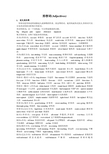
形容词(Adjectives)I.定义及分类形容词是用来说明或描述人或事物的性质、状态等的词。
就其构成形式而言,形容词可以分为单词形容词和复合形容词。
单词形容词:由一个词构成,可以带前缀或者后缀。
big diligent pale square dishonest impatient复合形容词:由两个或更多的词构成。
名词+形容词:sea-sick 晕船的air-sick 晕飞机的ice-cold 冰冷的duty-free 免税的snow-white 雪白的blood-thirsty 残忍的world-wide 世界性的shake-proof 防震的water-tight 不漏水的knee-deep 及膝的toll-free 免利息的top-heavy 头重脚轻的名词+名词-ed:iron-willed 意志坚强的ox-eyed 大眼睛的honey-mouthed 甜言蜜语的apple-shaped 苹果形状的lion-hearted 勇敢的silver-haired 银发的hook-nosed 勾鼻子的名词+现在分词:law-abiding 守法的time-consuming 耗费时间的self-sacrificing 自我牺牲的peace-loving 爱好和平的face-saving 顾面子的English-speaking 讲英语的pleasure-seeking 寻欢作乐的heart-rending 令人心碎的soul-stirring 感人肺腑的epoch-making 划时代的man-eating 吃人的fault-finding 喜欢挑剔的labor-saving 节省劳力的mouth-watering 令人垂涎的名词+过去分词:weather-beaten 饱经风霜的heart-felt 衷心的heart-broken 伤心的hand-made 手工的home-made 本国造的state-owned 国有的sugar-coated 糖衣的tongue-tied 结结巴巴的形容词(数词)+名词:long-distance 长途的fine-manner 举止优雅的present-day 当前的five-year 五年的bare-foot 赤脚的first-rate 一流的second-rate 二流的first-class 头等的deep-sea 深海的half-price 半价的one-way 单向(通行)的part-time 兼职的形容词(数词)+名词-ed:white-haired 白发的round-faced 圆脸的double-faced 两面派的teen-aged 十几岁的good-mannered 有礼貌的bad-tempered 坏脾气的narrow-minded 心胸狭窄的noble-minded 品格高尚的kind-hearted 心地善良的absent-minded 心不在焉的smooth-tongued 花言巧语的short-sighted目光短浅的near-sighted 近视的simple-minded 头脑简单的tight-fisted 吝啬的far-sighted 眼光远大的warm-hearted 热心的形容词+现在分词:good-looking 好看的sweet-smelling 好闻的easy-going 随和的thorough-going 彻底的fine-sounding 好听的形容词+过去分词:high-born 出身高贵的ready-made 现成的ready-cooked 烧好的native-born 本地生的new-built 重建的副词+形容词:ever-green 常青的all-round 全能的,全面的over-busy 太忙的over-credulous 过于轻信的over-critical 过于挑剔的(=hypercritical)副词+名词:off-hour 休息时间的off-guard 失去警惕的off-campus 校园外的off-key 不协调的off-budget 预算外的on-line 在线的副词+现在分词:ever-lasting 持久的on-coming 迎面而来的up-coming 即将来临的well-meaning 善意的far-reaching 深远的ever-increasing 不断增加的never-ending 不断的high-ranking 高级的副词+过去分词:well-known 著名的ill-mannered 举止粗鲁的well-behaved 表现好的well-informed 消息灵通的well-balanced 平衡的well-dressed 穿着时髦的badly-wounded 重伤的wide-spread 广泛流传的newly-built 新建的widely-used 广泛使用的well-equipped 装备精良的newly-married 新婚的形容词+形容词:red-hot 炽热的dark-green 深绿的bloody-red 血红的过去分词+介词:unthought-of 没有想到的unpaid-for 没付款的undreamed-of 连做梦也没想到的longed-for 渴望的uncalled-for 未被请求的unlooked-for 非期待的most-talked-about 谈得最多的yet-unheard-of 尚未听说过的(unheard-of=unprecedented)动词(过去分词)+副词:carry-on 随身携带的built-in 嵌入的cast-off 丢弃的drive-in 开车进去的unlived-in 没人住的其他类型:heart-to-heart 推心置腹的well-to-do 富裕的well-off 富裕的down-to-earth 讲究实际的life-and-death 生死攸关的根据其句法功能可以分为定语形容词,表语形容词和通用形容词:定语形容词:1. 起强调作用或特指作用的形容词: actual age chief cause main idea mere child only reason principal food sheer nonsense sole purpose total number2. 由名词转化而来的形容词:atomic energy, criminal law golden opportunity medical college表语形容词:1. 某些以a-开头的形容词: afraid alert alike alive alone aloof ashamed asleep astir awake aware2. 表示健康状况的形容词: faint ill well unwell注:ill作定语时,意为“坏的,邪恶的,恶劣的”如:ill luck/name/news/temper/wound等。
初中英语语法之形容词,副词

初中英语语法之形容词&副词初中英语语法之形容词&副词形容词副词的原级、比较级和最高级1、分类:形容词和副词有原级、比较级和最高级三级。
2、规则变化:(1)单音节和部分双音节形容词和副词,在原级的后面加上er,est构成比较级和最高级。
a)直接加er,est :b)以重读闭音节结尾的,要双写最后一个辅音字母,后加er,est:c)以辅音字母+y结尾的,先把y改为i再加上er,est:(2)两个音节或两个以上的音节的,在原级前加more / most.3、不规则变化:原级比较级最高级good好的better更好的best最好的well好;(身体)好的,bad,badly糟糕的,糟糕地worse更糟糕的,更糟糕地;(身体)更不舒服的worst最糟糕的,最糟糕地;(身体)最不舒服的ill(身体)不舒服的many许多的(可数)more更多的;更most最多的;最much许多的(不可数);非常little少的less更少的least最少的far远的;远地farther更远的;更远地farthest最远的;最远地further进一步的(地)furthest最深刻的(地)4、形容词和副词的原级、比较级和最高级的用法:(1) 讲述某人/物自身的情况时,用原级。
基本句型是:主语(sb./sth) + 谓语动词+(very/too/so/quite/rather…) + 形容词/副词原级+….如:He is very oldnow. 他现在很老了。
They ran quitefast. 它们跑得相当快。
The weatherlooks rather bad. 天气看上去相当糟。
I am sohappy! 我是如此的快乐!☆表示两者之间没有差别时,使用句型:主语(第一个人物) + 谓语动词 + as + 形容词/副词原级 + as + 第二个人物+….如He is as excited as his younger sister. 他和他妹妹一样兴奋。
初中英语语法形容词副词讲解
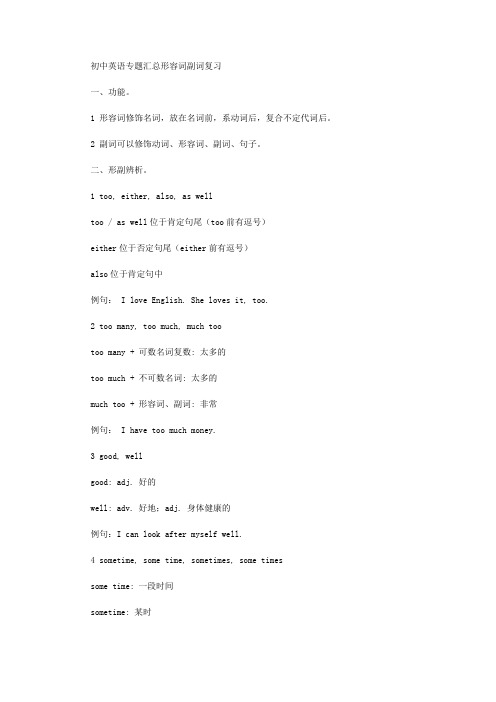
初中英语专题汇总形容词副词复习一、功能。
1 形容词修饰名词,放在名词前,系动词后,复合不定代词后。
2 副词可以修饰动词、形容词、副词、句子。
二、形副辨析。
1 too, either, also, as welltoo / as well位于肯定句尾(too前有逗号)either位于否定句尾(either前有逗号)also位于肯定句中例句: I love English. She loves it, too.2 too many, too much, much tootoo many + 可数名词复数: 太多的too much + 不可数名词: 太多的much too + 形容词、副词: 非常例句: I have too much money.3 good, wellgood: adj. 好的well: adv. 好地;adj. 身体健康的例句:I can look after myself well.4 sometime, some time, sometimes, some timessome time: 一段时间sometime: 某时some times: 几次sometimes: 有时候例句:Sometime you can realize your dream.5 alone, lonelyalone: adj. 独自的;adv. 独自地lonely: adj. 孤独的6 ill, sickill: 当做“生病的”讲时,只用于系动词后sick: 用于名词前或系动词后7 hard, hardlyhard: adv. 努力地;adj. 困难的,坚硬的hardly: adv. 几乎不8 -ed, -ing-ed: 感到...的-ing: 令人...的9 enoughenough用于名词前或形容词副词后三、比较级最高级。
1 比较级最高级构成规则变化。
初中英语语法---形容词和副词含练习

专题复习---形容词和副词〔一〕一、形容词的构成及其用法用以修饰名词等表示人和事物的性质、特征的词叫形容词。
它在句中可以充当定语、表语和宾语补足语,一般放在所修饰词的前面。
Eg. Those big moon cakes are delicious. (作表语)Eg. There are many beautiful flowers in the park. (作定语)1.修饰词尾为-body/-one; -thing不定代词时,必须放在其后。
Eg. There’s nothing wrong with my bike.Eg. Please give me something delicious to eat.Eg. Anybody clever can’t do such stupid things.2.表示长、宽、高、深或年龄的形容词的常用构造:数词+名词+形容词12 years old/ 8meters long/ 3 meters wide/ 100 kilometers high/ 1.8meters tallEg. It’s a river 6 meters deep.Eg. That’s a road 300 kilometers long.Eg. The young man is 1.8 meters tall.3.系动词〔look, sound, smell, taste, feel〕之后要接形容词Eg. The soup tastes nice.Eg. They all looked very happy after hearing the good news.4.–ing形容词和-ed形容词的区别-ed形容词通常用来形容人,而-ing形容词通常用来形容事或物如:disappointed/e*cited/interested/surprised/bored/amazed/rela*ed (*人)感到失望/兴奋/有趣/奇怪/厌烦/震惊/放松disappointing/e*citing/interesting/surprising/boring/amazing /rela*ing〔*事〕令人失望的/兴奋的/有趣的/奇怪的/厌烦的/震惊的/放松的5.“the +局部形容词〞表示“一类人〞the young the old the rich the poor二、副词的构成和用法。
初中英语语法—形容词、副词 PPT课件 图文

5. They watched a movie and felt quite __A___ .
A. sad B. sadly C. sadness D. sady
形容词作宾语补 足语
某些动词如make,paint,keep,find, like,want等后接名词或代词作宾语,再接 形容词作宾语补足语,补充说明宾语的状态、 特征等。形容词和宾语一起构成复合宾 语.有的已构成固定词组。
an old big brown wooden box 一个旧而大的棕色木箱子 two tall young Japanese girls 两位高个、年轻的日本姑娘
例题
1) Tony is going camping with ___ boys. A. little two other B. two little other C. two other little D. little other two
1.He is a good student. 2. She is a beautiful girl. 3. I have a clever pet dog.
2)多个形容词做定语时的排列顺序:
口诀: 冠代数形大,新色国材名
注释: 冠----冠词;代----代词;数----数词;形----形状、 性质;大----大小、长短;新----新旧;色----颜色; 国----国家、产地;材----材料、用途;名-----名词
The windows of our classroom are cleaner than those of theirs.
形容词原级的常用句
初中英语语法与词汇(形容词,副词)
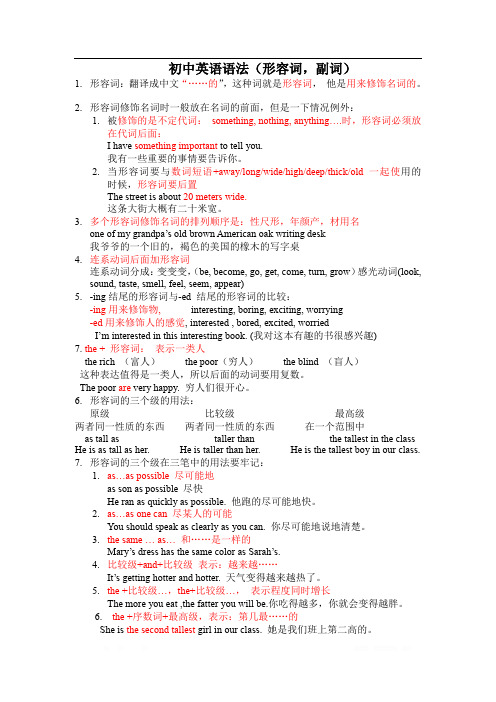
初中英语语法(形容词,副词)1.形容词:翻译成中文“……的”,这种词就是形容词,他是用来修饰名词的。
2.形容词修饰名词时一般放在名词的前面,但是一下情况例外:1.被修饰的是不定代词:something, nothing, anything….时,形容词必须放在代词后面:I have something important to tell you.我有一些重要的事情要告诉你。
2.当形容词要与数词短语+away/long/wide/high/deep/thick/old 一起使用的时候,形容词要后置The street is about 20 meters wide.这条大街大概有二十米宽。
3.多个形容词修饰名词的排列顺序是:性尺形,年颜产,材用名one of my grandpa’s old brown American oak writing desk我爷爷的一个旧的,褐色的美国的橡木的写字桌4.连系动词后面加形容词连系动词分成:变变变,(be, become, go, get, come, turn, grow)感光动词(look, sound, taste, smell, feel, seem, appear)5.-ing结尾的形容词与-ed 结尾的形容词的比较:-ing用来修饰物,interesting, boring, exciting, worrying-ed用来修饰人的感觉, interested , bored, excited, worriedI’m interested in this interesting book. (我对这本有趣的书很感兴趣)7. the + 形容词:表示一类人the rich (富人)the poor(穷人)the blind (盲人)这种表达值得是一类人,所以后面的动词要用复数。
The poor are very happy. 穷人们很开心。
6.形容词的三个级的用法:原级比较级最高级两者同一性质的东西两者同一性质的东西在一个范围中as tall as taller than the tallest in the class He is as tall as her. He is taller than her. He is the tallest boy in our class.7.形容词的三个级在三笔中的用法要牢记:1.as…as possible 尽可能地as son as possible 尽快He ran as quickly as possible. 他跑的尽可能地快。
初中英语语法——形容词副词
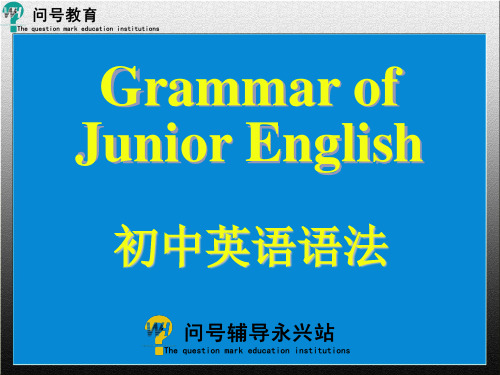
A living language should be learned orally(口头上). (活的语言应该从口头上学)(被动句) We have a living hope that you will succeed. (我们强烈地希望你能成功) Is she still alive? (她还活着吗?) They are the happiest children alive. (他们是活着的最开心的孩子)
⒀ gone、lost与missing
gone表示“丢了,没了”,含一去不复返 的意思,也可以表示“死了”,作表语或 宾补,不可以作定语; lost表示“丢失”,含难以找回的意思, 可作定语、表语或宾补; missing表示“失踪了,不见了”,强调 某人物不在原处,可作定语、表语或宾补。
My fever(高烧) is gone, but I still have a cough. (发烧消退了,但我仍然咳嗽) The parents found the lost child at last. (家长终于找到了迷路的孩子) My dictionary is missing.Who’s taken it away? (我的字典不见了,谁拿走了?) For more detailed information(详情) of the missing girls, please visit our website(网址). (如果想知道失踪女孩们的 详情,请访问我们的网站)
⑿ special与especial
表示事件不同寻常、过分或特殊时,两个词可 互换,但special较为常用。另外,special还可 以表示特别的目的。 She pays (e)special attention to clothes. (她非常注重着装) These are special chairs for small children. (这些是专门给小孩子的椅子)
初中英语语法大全——形容词和副词
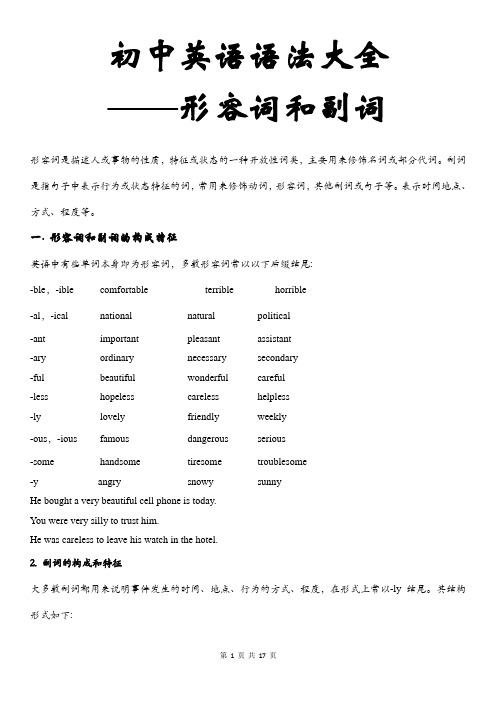
初中英语语法大全——形容词和副词形容词是描述人或事物的性质,特征或状态的一种开放性词类,主要用来修饰名词或部分代词。
副词是指句子中表示行为或状态特征的词,常用来修饰动词,形容词,其他副词或句子等。
表示时间地点、方式、程度等。
一. 形容词和副词的构成特征英语中有些单词本身即为形容词,多数形容词常以以下后缀结尾:-ble,-ible comfortable terrible horrible-al,-ical national natural political-ant important pleasant assistant-ary ordinary necessary secondary-ful beautiful wonderful careful-less hopeless careless helpless-ly lovely friendly weekly-ous,-ious famous dangerous serious-some handsome tiresome troublesome-y angry snowy sunnyHe bought a very beautiful cell phone is today.You were very silly to trust him.He was careless to leave his watch in the hotel.2. 副词的构成和特征大多数副词都用来说明事件发生的时间、地点、行为的方式、程度,在形式上常以-ly结尾。
其结构形式如下:The detective carefully observed everything in the room.He will completely finish his work by the end of this month.Such things will easily happen.二. 形容词和副词的种类1. 形容词的种类(1) 根据其结构形式分类,形容词可以分为简单形容词和合成形容词两类。
初中英语语法 形容词和副词

Farther/further Farthest/furthest
older
oldest
3、形容词,副词比较等级的用法
等
句型
例句
级 1、as+原级+as
She is as kind as her
原 级
2、not + so/as + 原级+ as
mother Lucy didn’t do it so/as
4. An elephant is __D__ than a tiger
A. Heavy
B. very heavy
C. the heaviest
D. heavier
5. A horse is ___C___ than a dog
A.Much heavy
B. more heavier
C. much heavier
(1)在形容词比较级前可用much, even ,still ,a little Far, a lot来修饰,表示程度。
(2)可用“比较级形式+than any other +单数 名词来表达最高级的意思 He is taller than any other student in the school 。
well as you
比 比较级 + than
较 级
He is taller than lilei
The weather is getting hotter and hotter
最 the+最高级+of /in
高 级
She is the tallest one in her class
4.使用形容词比较级时 注意:
最全初中英语语法之-形容词和副词的比较级和最高级
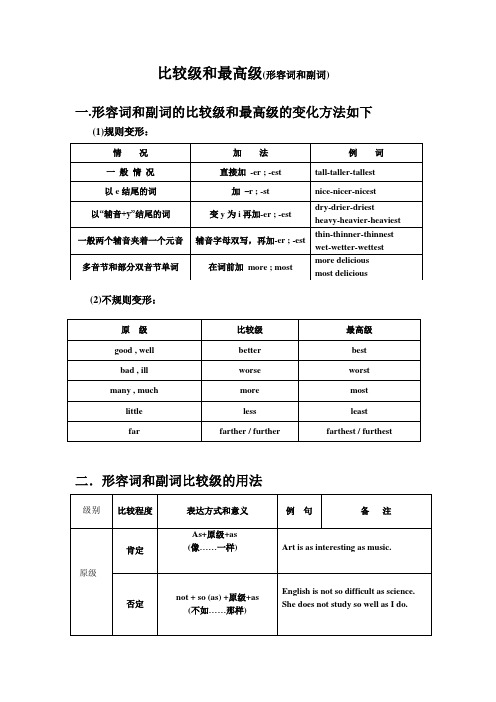
比较级和最高级(形容词和副词)一.形容词和副词的比较级和最高级的变化方法如下(1)规则变形:(2)不规则变形:二.形容词和副词比较级的用法注意:有些形容词,如 dead, empty, round, sure, woolen 等受本身含义的限制,没有比较级。
练习与巩固1. ______ children there are in family,_______ their life will be.(b)A. The less; the betterB. The fewer; the betterC. Fewer; richerD. More; poorer2. Most of the people in Guangdong are getting ________.(c)A. more and more richB. more rich and more richC. richer and richerD. richer and richest3. Which lesson is _______, this one or that one? (c)A. difficultB. much difficultC. more difficultD. the most difficult4. In our city, it is ______ in July, but it is even _______ in August. (d)A. hotter; hottestB. hot; hotC. hotter; hotD. hot; hotter5. This pencil is ______ that one. (c)A. so long asB. as longer asC. longer thanD. not as longest as6. India has the second _______ population in the world. (d)A. largerB. mostC. smallestD. largest7. Of the two Australian students , Masha is _____ one. I think you can find her easily. (b)A, tallest B, the taller C. taller D. the tallest8. She is ______than her younger sister. (c)A.less richerB. not more richC. less richD. not rich9. ---What do you think of the plan?---I feel ___that we ought to give it up at once. (c)A. strongB. strongerC. stronglyD. it strong。
初中英语语法专题五 形容词和副词
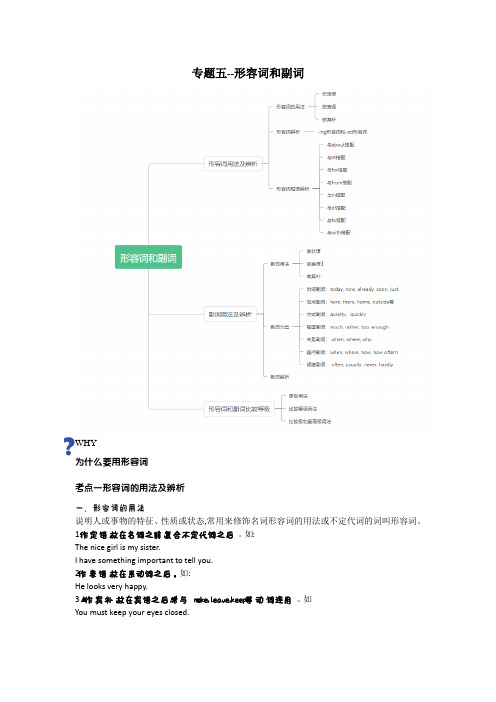
专题五--形容词和副词WHY为什么要用形容词考点一形容词的用法及辨析一、形容词的用法说明人或事物的特征、性质或状态,常用来修饰名词形容词的用法或不定代词的词叫形容词。
1.作定语,放在名词之前,复合不定代词之后。
如:The nice girl is my sister.I have something important to tell you.2作表语,放在系动词之后。
如:He looks very happy.3▲作宾补,放在宾语之后,常与m a ke, leave,keep等动词连用。
如You must keep your eyes closed.二、形容词辨析1.-ing 形容词和-ed形容词2.区别是什么:▲-ing用来表示一个人,一个物或者一种情景的特征▲-ed用来形容人的感觉或者情感比较:My girlfriend is bored.My girlfriend is boring.-ing形容词修饰物-ed形容词修饰物例句Surprising Surprised This is a surprising story.I am surprised at the news.interesting interested I read an interesting book last week.Are you interested in watching football games?exciting Excited Lucy told me that she had an exciting journy this summer holiday.I’m excited about the traveling.pleasing pleased This is a pleasing trip.Mr. Smith is pleased with our performance.frightening frightened We were told a frightening story last night.we are frightened of the ghost.moving moved Titanic is a moving film.All the people were deeply moved by the love of Jack and Rose. tiring tired It’s a long tiring day.I’m too tired to go out again.fascinating Fascinated What a fascinating voice!Many boys are fascinated by computer games.Amusing Amused He likes to surround himself with amusing people.We were all amused at his stories.Disappointing Disappointed If you do, you’ll only be disappointed.It was disappointing to lose the game.Worrying Worried We are worried about you.Her sisuation is worring.3.多个形容词修饰同一个名词时的顺序-描绘形容词—大小(长短高低)形容词—形状形容词—年龄(新旧)形容词—颜色形容词—国籍形容词—材料形容词—用途(类别)形容词—名词I bought a nice(好看的) small(小小的) round(圆形的) new(新的) yellow(黄色的) French (法国产的) oak(橡木做的) writing desk.太长了.....我们常用的是这样的↓↓:an old Chinese stone bridgesome beautiful little red flowers但如果确实要用这么多定语来修饰这个writing desk的话可以怎么做呢?如何辨别哪些是形容词呢:通常来讲如下后缀结尾的词为形容词:-al, -ial, -ical:national, essential, criticial,special, social,central, general-able, -ible:vuable, edible,unable, suitable, reasonable,possible, responsible-an, -ian:American, Roman,Australian-full:meaninful, faithful, beautiful-ic:energetic,public,academic, fantastic, dramatic-ical:biological, chemical, logical,medical,musical, physical,-ive:active,creative, commutative,decisive, effective-ish:foolish, selfish, childish,girlish, yellowish-less:meaningless, endless, useless,helpless,colorless-y:easy, ready,dry, cloudy, sunny, rainy,snowy-ous, -ose: various, famous,curious,dangerous-ant, -ent:important, brriliant,dominant, distant,diffrent, present, recent-ile:4.形容词短语辨析在英语中有很多形容词后需要加特定的介词构成形容词短语,常见的有: (1)与a bout搭配be careful about对……小心be sure about对…有把握be crazy about对…热衷be curious about对……好奇be worried about对…担忧be anxious about对感到焦虑be sorry about对…感到遗憾be strict about sth.对某事要求严格(2)与a t搭配be amused at以为乐be annoyed at对…恼怒be surprised at对感到惊奇be angry at对生气be good at在…方面擅长的用(与期词(3)与f or搭配be famous for因…而著名get ready for做好准备be sorry for感到抱歉be fit/unfit for适合/不适合be good for对有好处be bad for对…有坏处be suitable for适合be thirsty for渴望(4)与f rom搭配be absent from缺席be different from与不同be separated from和…分离开(5)与in搭配be interested in对……感兴趣be weak in在...方面薄弱be different in在…方面不同be successful in在…方面成功(6)与搭配be afraid of害怕be fond of喜欢be proud of为感到自豪be tired of对…感到厌倦be full of充满be careful of对…小心be short of…短缺be ashamed of对…感到羞愧(7)与t o搭配be close to接近,靠近be good to对…好be kind to对和蔼be rude to对……粗鲁be polite to对……有礼貌be useful to对……有用be related to与……有关be similar to与……相似(8)与w ith搭配be angry with对……生气be careful with小心be busy with忙于be filled with充满be related to与有be similar to与相似(8)与w ith搭配be angry with对……气be careful with小心be busy with忙于be filled with充满be satisfied with对……感到满意be pleased with对……感到满意be patient with对……有耐心be strict with sb.对某人要求严格WHY什么是副词?为什么要使用副词?Even after one year of lessons, Luke plays the piano badly.He's always in a rush. I don't understand why he walks so quicklyMichael happily took the assistant job. He had been looking for a position all summer.以上表示how,怎么样,以什么方式I couldn’t find the car keys inside your purse.The lift is moving up.-Where is Lucy? I haven’t seen for a while.-She is/went abroad.Wendy threw the garbage out, but the flies would not leave.以上表示where,在哪里I didn’t go to the museum yesteday.Charlie, can you wait me for a second? I’ll be back soon.I have already finished the project.The recently found Wallace was so lost that he just wandered aimlessly in circles.以上表示when,在什么时候。
初中英语语法大全:形容词和副词汇总
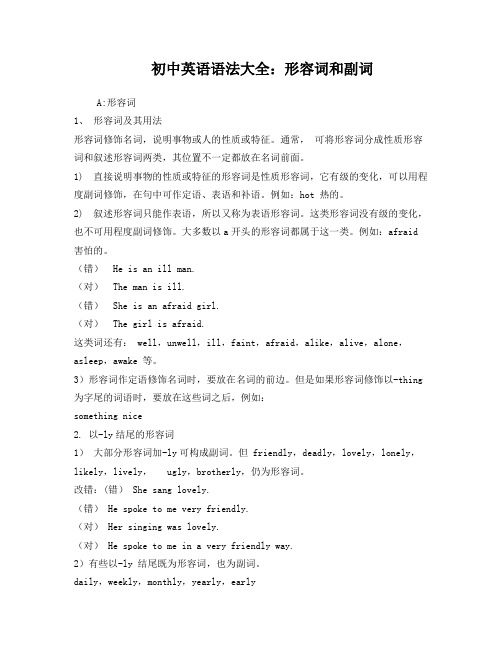
初中英语语法大全:形容词和副词A:形容词1、形容词及其用法形容词修饰名词,说明事物或人的性质或特征。
通常,可将形容词分成性质形容词和叙述形容词两类,其位置不一定都放在名词前面。
1) 直接说明事物的性质或特征的形容词是性质形容词,它有级的变化,可以用程度副词修饰,在句中可作定语、表语和补语。
例如:hot 热的。
2) 叙述形容词只能作表语,所以又称为表语形容词。
这类形容词没有级的变化,也不可用程度副词修饰。
大多数以a开头的形容词都属于这一类。
例如:afraid 害怕的。
(错)He is an ill man.(对)The man is ill.(错)She is an afraid girl.(对)The girl is afraid.这类词还有: well,unwell,ill,faint,afraid,alike,alive,alone,asleep,awake 等。
3)形容词作定语修饰名词时,要放在名词的前边。
但是如果形容词修饰以-thing 为字尾的词语时,要放在这些词之后,例如:something nice2. 以-ly结尾的形容词1)大部分形容词加-ly可构成副词。
但 friendly,deadly,lovely,lonely,likely,lively, ugly,brotherly,仍为形容词。
改错:(错) She sang lovely.(错) He spoke to me very friendly.(对) Her singing was lovely.(对) He spoke to me in a very friendly way.2)有些以-ly 结尾既为形容词,也为副词。
daily,weekly,monthly,yearly,earlyThe Times is a daily paper.The Times is published daily.3 用形容词表示类别和整体1)某些形容词加上定冠词可以泛指一类人,与谓语动词的复数连接。
初中英语语法形容词与副词
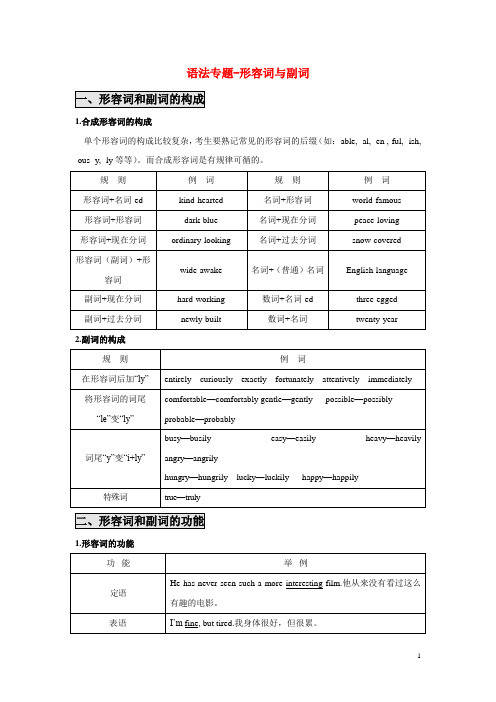
语法专题-形容词与副词一、形容词和副词的构成1.合成形容词的构成单个形容词的构成比较复杂,考生要熟记常见的形容词的后缀(如:-able, -al, -en ,-ful, -ish, -ous -y, -ly等等)。
而合成形容词是有规律可循的。
规则例词规则例词形容词+名词-ed kind-hearted 名词+形容词world-famous 形容词+形容词dark-blue 名词+现在分词peace-loving形容词+现在分词ordinary-looking 名词+过去分词snow-covered形容词(副词)+形容词wide-awake 名词+(普通)名词English-language 副词+现在分词hard-working 数词+名词-ed three-egged 副词+过去分词newly-built 数词+名词twenty-year2.副词的构成规则例词在形容词后加―ly‖entirely curiously exactly fortunately attentively immediately将形容词的词尾―le‖变―ly‖comfortable—comfortably gentle—gently possible—possibly probable—probably词尾―y‖变―i+ly‖busy—busily easy—easily heavy—heavily angry—angrilyhungry—hungrily lucky—luckily happy—happily特殊词true—truly二、形容词和副词的功能1.形容词的功能功能举例定语He has never seen such a more interesting film.他从来没有看过这么有趣的电影。
表语I’m fine, but tired.我身体很好,但很累。
★(1)连系动词+adj. 连系动词:①be动词②感官动词(look; smell; feel; touch; taste; sound)③“变化”型:(become; turn; go; get…)④―保持‖型:(keep /remain/stay…)★(2)It’s+adj.+(for/of sb.)+to do sth. ★(3)so+adj.+that句子“如此…以至…”★(4)too+adj.+to do sth.★(5)形容词/副词+enough The weather i s getti ng warmer and warmer.天气变得越来越暖和。
初中英语语法专项7形容词和副词

以及疑用法
(1)用作状语。
He speaks English very well
.
他英语说得非常好。 Luckily , Simon didn’t hurt himself.
幸运的是,西蒙没伤着自己。
(2)用作表语。主要限于少数状态或位置副词、时间副词以及其他副词,如in, out, on, back, down, up等。 I’ll be back in five minutes. 我五分钟后就回来。 (3)用作定语。通常情况下,副词用作定语时总是放在被修饰的名词或代词之后。 The people there are very friendly. 那里的人很友好。
Lucy is as tall as Kate. 露西和凯特一样高。
Tom runs as fast as
Mike. 汤姆和迈克跑得一样快。
②“A+v.+not+as/so+形容词/副词原级+as+B” 表示“A不如B……”。
This classroom isnot as/so big as that one. 这间教室不如那间大。
最高级 tallest longest
nicest largest
happiest funniest biggest hottest thinnest
most beautiful most slowly
2.不规则变化 good/well—better—best many/much—more—most ill/bad/badly—worse—worst little— less — least far—farther/further—farthest/furthest
初中英语语法--形容词和副词用法详解
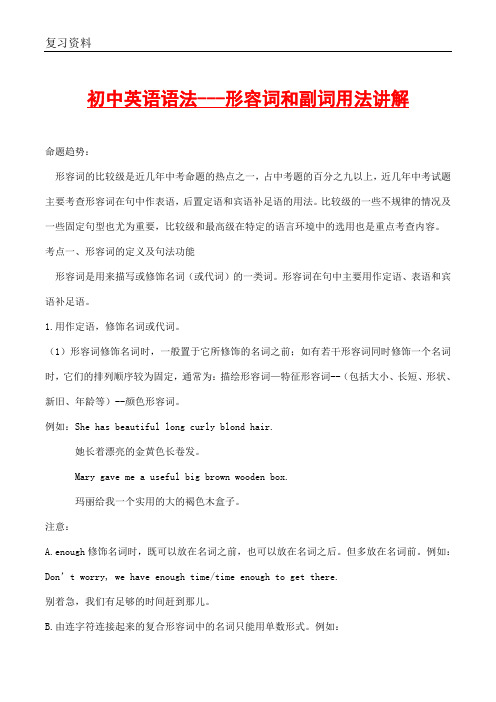
初中英语语法---形容词和副词用法讲解命题趋势:形容词的比较级是近几年中考命题的热点之一,占中考题的百分之九以上,近几年中考试题主要考查形容词在句中作表语,后置定语和宾语补足语的用法。
比较级的一些不规律的情况及一些固定句型也尤为重要,比较级和最高级在特定的语言环境中的选用也是重点考查内容。
考点一、形容词的定义及句法功能形容词是用来描写或修饰名词(或代词)的一类词。
形容词在句中主要用作定语、表语和宾语补足语。
1.用作定语,修饰名词或代词。
(1)形容词修饰名词时,一般置于它所修饰的名词之前;如有若干形容词同时修饰一个名词时,它们的排列顺序较为固定,通常为:描绘形容词—特征形容词--(包括大小、长短、形状、新旧、年龄等)--颜色形容词。
例如:She has beautiful long curly blond hair.她长着漂亮的金黄色长卷发。
Mary gave me a useful big brown wooden box.玛丽给我一个实用的大的褐色木盒子。
注意:A.enough修饰名词时,既可以放在名词之前,也可以放在名词之后。
但多放在名词前。
例如:Don’t worry, we have enough time/time enough to get there.别着急,我们有足够的时间赶到那儿。
B.由连字符连接起来的复合形容词中的名词只能用单数形式。
例如:an eight-year-old boy 一个8岁的男孩(2)形容词修饰由some,any,every,no等构成的复合不定代词时,需后置。
例如:Will you please tell us something interesting?你给我们说一些有趣的事好吗?There’s nothing special in the box.盒子里没有什么特别的东西。
Anyone intelligent can do it.任何有智力的人都能做这件事。
- 1、下载文档前请自行甄别文档内容的完整性,平台不提供额外的编辑、内容补充、找答案等附加服务。
- 2、"仅部分预览"的文档,不可在线预览部分如存在完整性等问题,可反馈申请退款(可完整预览的文档不适用该条件!)。
- 3、如文档侵犯您的权益,请联系客服反馈,我们会尽快为您处理(人工客服工作时间:9:00-18:30)。
形容词和副词一、形容词1)、⑴作定语时放在名词的前面,且音节少的词放在音节多的词之前。
如:a big yellow wooden wheel(一个黄色的大木轮)⑵作表语时放在连系动词之后。
如:The price sounds reasonable.(这个价格听起来算是合理)⑶作宾语补足语时放在宾语之后。
如:We must try our best to keep our environment clean.(我们必须尽力保持我们的环境清洁)⑷后置的情况:①修饰复合不定代词时放在代词之后。
如:Something serious has happened to him.(他发生了严重的事故)②与表示“长、宽、高、重、老、远离”的词连用时形容词后置。
如:He’s 1.8 metres tall.(他身高1.8米。
)The moon is about 380,000 kilometres away from the earth.(月球离地38万公里)2) 、多个形容词修饰同一个名词的顺序:二、副词(1)作状语1.时间副词:一般放在句首或句尾,注意,early、late、before、later、yet等一般放在句尾,already、just一般放在动词的前面。
如:We will visit the Great Wall tomorrow.(我们明天要去参观长城) / They have already been to the UK twice.(他们去过英王国两次) / Soon the lost boy found his way back home.(不久迷路的孩子找到了回家的路)2.地点副词:一般放在句尾,但here、there还可放在句首。
如:There you can see thousands of bikes running in all directions(方向).(在那里,你可以看到成千上万的自行车朝各个方向流动) / The frightened wolf ran away.(受到惊吓的狼逃开了)/ He walked out quietly and turned back soon.(他悄悄地走了出去,很快又返回)3.方式副词:一般放在行为动之后,suddenly可以放在句首、句尾或动词之前。
如:Old people can hardly walk as quickly as young people.(老年人几乎不可能走得和年轻人一样快) / Suddenly he saw a light in the dark cave(山洞).(突然,在黑黢黢的山洞里,他看见了一丝亮光)4.程度副词:修饰动词时,放在动词之前;修饰形容词或副词时,放在形容词或副词之前。
但注意,enough总是放在被修饰的形容词或动词的后面;only位置比较灵活,总是放在被修饰的词的前面。
如:I nearly forgot all about it if he did not tell me again.(如果他不再次告诉我,我几乎把那事全忘了) / It was so strange that I could hardly believe my ears.(它那么奇怪一直我都不能相信我的耳朵) / She got to the station early enough to catch the first bus.(她早早地赶到车站赶上了首班车)5.频度副词:一般放在be动词之后或者助动词与主要动词之间,但sometimes、often等还可以放在句首或句尾,usually可放在句首,once可放在句尾,twice、three times等一般放在句尾。
如:Sometimes I get up early.(我有时起得早)/ The workers usually have lunch at the factory.(工人们通常在厂里吃午饭) / Take this medicine twice a day.(这种药一天吃两次)6.疑问副词:用于对句子的状语进行提问,位置总是在句首。
如:When and where were you born?(你何时何地出生?)/ Why did little Edison sit on some eggs?(小爱迪生为什么要坐在鸡蛋上?)/ How do you do?(你好!)7.连接副词:用来引导主语从句、宾语从句和表语从句,在从句中作状语。
How I am going to kill the cat is still a question.(我打算怎样杀死那只猫还是个问题)/ That is why everyone is afraid of the tiger.(那就是人人都害怕老虎的原因) / He wondered how he could do it the next day.(他不知道第二天怎样做那事)8.关系副词:用来引导定语从句,在从句中作状语。
如:This is the place where Mr Zhang once lived.(这就是张先生曾经住过的地方)/ Please tell me the way how you have learned English so well.(请告诉我你的英语是怎样学得这么好的方法)9.其它副词:too“也”,用在句尾;also放在动词前;either “也不”,放在句尾;nor“也不”,放在句首;so“如此,这样”,放在形容词、副词前;on/off“开/关”放在动词之后;not放在be之后、助动词之后、不定式或动名词之前;maybe/perhaps放在句首;certainly放在句首或动词之前。
如:He went to the Palace Museum and I went there,too.(他去了故宫博物院,我也去了) / Maybe your ticket is in your inside pocket.(也许你的票就在你的里边衣袋里) / --Tom doesn’t have a computer. –Nor do I.(汤姆没有计算机,我也没有。
)地点副词一般可以作表语,放在be等连系动词之后,说明人物所处的位置。
如:I’m very sorry he isn’t in at the moment.(很抱歉,他此刻不在家)/ I have been away from my hometown for nearly 20 years.(我离开家乡有将近20年了) / Jim is over there.(吉姆就在那边)时间副词(如now、then)以及许多地点副词都可以作名词的定语,放在名词的后面。
如:People now often have their festival dinners at restaurants.(现在的人们经常在餐馆里吃节日晚宴) / Women there were living a terrible life in the 1920s.(在二十世纪20年代那儿的女人过着可怕的日子)地点副词一般可以作宾语补足语。
如:Put your dirty socks away, Jim! They are giving out bad smell!(吉姆,把你的脏袜子拿开!它们在散发着臭气。
) / Father kept him in and doing his lessons.(父亲把他关在家里做作业)[注意] “动词+副词”的宾语如果是代词,则该副词应该放在代词之后。
如:He wrote down the word.(他写下了那个词。
)→He wrote it down.(他把它写了下来。
)==形容词变副词的规律a.一般的形容词在结尾加ly变为副词。
例如:careful-carefullyb.以元音加e结尾的单词要去e在加ly。
例如:true-trulyc.辅音加y结尾的单词去y变i在加ly。
例如:angry-angrilyd.单音节y结尾直接加ly。
例如:shy-shylye.以le结尾的单词直接将e变为y。
例如:terrible-terriblyf.形容词、副词同形:hard, fast, friendly, late, early, lovely, long。
这部分请同学们注意,其中很多单词加ly之后就变成其他意思的单词了。
例如:hardly就变成“几乎不”的意思,是小学阶段五大隐形否定词(few,little, never, seldom, hardly)之一。
三、形容词副词的原级、比较级和最高级原级变为比较级和最高级有规则变化和不规则变化两种。
(1)单音节和部分双音节形容词和副词,在原级的后面加上er,est构成比较级和最高级。
a)直接加er,est :b)以重读闭音节结尾的,要双写最后一个辅音字母,后加er,est:c)以辅音字母+y结尾的,先把y改为i再加上er,est:(2)两个音节或两个以上的音节的,在原级前加more / most.(1)讲述某人/物自身的情况时,用原级。
基本句型是:主语(sb./sth) + 谓语动词+ (very/too/so/quite/rather…) + 形容词/副词原级+….如:He is very old now.(他现在很老了) / They ran quite fast.(它们跑得相当快) / The weather looks rather bad.(天气看上去相当糟) / I am so happy!(我是如此的快乐)☆表示两者之间没有差别时,使用句型:主语(第一个人物) + 谓语动词+ as + 形容词/副词原级+ as + 第二个人物+….如:He is as excited as his younger sister.(他和他妹妹一样兴奋)/ Lily rode her bike as slowly as an old lady.(莉莉骑车像老太太一样慢)/ They picked as many apples as the farmers (did).(他们摘的苹果和农民一样多)☆表示第一个人比不上第二个人时,使用句型:主语(第一个人物) + 谓语动词(否定式)+ as / so + 形容词/副词原级+ as + 第二个人物+….如:He isnot so / as excited as his younger sister.(他没他妹妹那么兴奋) / Lily did not ride her bike so / as slowly as an old lady. (莉莉骑车不像老太太那样慢) / They didn’t pick so / as many apples as the farmers (did). (他们摘的苹果不如农民多)(2) 讲述两者有差异,第一个人物超过第二个人物时,用比较级。
